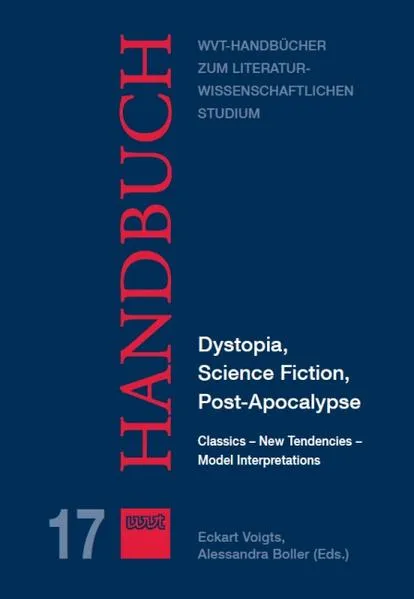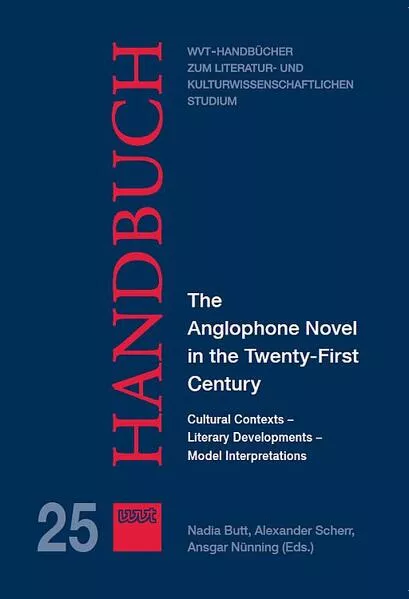WVT Handbücher zum literatur- und kulturwissenschaftlichen Studium
Dystopia, Science Fiction, Post-Apocalypse
Chronologie aller Bände (1 - 2)
Die Reihenfolge beginnt mit dem Buch "Dystopia, Science Fiction, Post-Apocalypse". Wer alle Bücher der Reihe nach lesen möchte, sollte mit diesem Band von Eckart Voigts beginnen. Mit insgesamt 2 Bänden wurde die Reihe über einen Zeitraum von ungefähr 9 Jahren fortgesetzt. Der neueste Band trägt den Titel "The Anglophone Novel in the Twenty-First Century".
- Anzahl der Bewertungen für die gesamte Reihe: 3
- Ø Bewertung der Reihe: 2.5
- Start der Reihe: 02.01.2015
- Neueste Folge: 26.09.2023
Diese Reihenfolge enthält 2 unterschiedliche Autoren.
- Band: 17
- Autor: Voigts, Eckart
- Anzahl Bewertungen: 2
- Ø Bewertung: 4.0
- Medium: Buch
- Veröffentlicht: 02.01.2015
- Genre: Sonstiges
Dystopia, Science Fiction, Post-Apocalypse
Dystopian and post-apocalyptic narratives, often within the generic framework of science fiction, are currently enjoying a remarkable popularity. Two world wars that brought the nemesis of technology and rationality, large-scale industrialism, collectivism and mass culture – these are historical stepping stones towards the rise of the classic dystopian and apocalyptic imagination in the 20th century. Since then, narratives of a future societal collapse have responded to a set of urgent challenges that, if anything, have increased at the beginning of the 21st century, from climate change and other eco-disasters to the economic crises of globalisation, fundamentalist counter-reactions to modernity, the rise of Big Data, the scientific dynamics in biotechnology, wild urbanisation, migration and displacement, and more.
This collection of essays presents an introduction to the field, providing model analyses of key texts, and taking a look at these visions of crisis and collapse not only in prose fiction, but also in films, graphic novels and computer games. Structured according to the main thematic and conceptual clusters (totalitarian, biopolitical, mechanistic, ambiguous, religious, eugenic dystopia etc.), this handbook offers fresh readings of the classics of dystopian literature (Wells, Orwell, Huxley, Forster, Golding, and others). It also focuses on the defining current fictions that resonate with readers and viewers around the globe, from Margaret Atwood’s eco-dystopias and the gendered science fiction of Ursula K. Le Guin or Octavia Butler to post-colonial (J. M. Coetzee), post-nuclear and postmodern dystopias (Blade Runner, The Matrix, Cloud Atlas), and from cyberpunk and post-apocalyptic narratives such as Cormac McCarthy’s The Road to young adult dystopias such as Suzanne Collins’ The Hunger Games.
This collection of essays presents an introduction to the field, providing model analyses of key texts, and taking a look at these visions of crisis and collapse not only in prose fiction, but also in films, graphic novels and computer games. Structured according to the main thematic and conceptual clusters (totalitarian, biopolitical, mechanistic, ambiguous, religious, eugenic dystopia etc.), this handbook offers fresh readings of the classics of dystopian literature (Wells, Orwell, Huxley, Forster, Golding, and others). It also focuses on the defining current fictions that resonate with readers and viewers around the globe, from Margaret Atwood’s eco-dystopias and the gendered science fiction of Ursula K. Le Guin or Octavia Butler to post-colonial (J. M. Coetzee), post-nuclear and postmodern dystopias (Blade Runner, The Matrix, Cloud Atlas), and from cyberpunk and post-apocalyptic narratives such as Cormac McCarthy’s The Road to young adult dystopias such as Suzanne Collins’ The Hunger Games.
- Band: 25
- Autor: Butt, Nadia
- Anzahl Bewertungen: 1
- Ø Bewertung: 1.0
- Medium: Buch
- Veröffentlicht: 26.09.2023
- Genre: Roman
The Anglophone Novel in the Twenty-First Century
In an age pervaded by global crises and planetary concerns, the Anglophone novel is undergoing significant transformations – as are the theoretical vantage points from which literary scholars study literature. This handbook aims to establish a decidedly transnational and global perspective on the contemporary novel in English. In addition to offering frameworks for theorising Anglophone literature (postcolonial studies, world literary studies, new sociological approaches, and more), it surveys (trans)cultural contexts of Anglophone fiction, literary responses to global concerns, and new novelistic forms as well as transformations of established genres.
Addressing students, professors, and literary scholars alike, the volume explores the following key questions: What are the dominant themes and topics of 21st-century Anglophone novels? Which cultural dynamics have impacted the development of Anglophone fiction, roughly over the past two decades? How can we link these developments to the genre of the novel with its European legacies? What authors – from all parts of the globe – have shaped the Anglophone literary field? Which works are among the most significant novels of the new millennium so far, and how have they altered and propelled our very notion of ‘the Anglophone novel’? What new forms of the novel have emerged in recent years, and how have established genres been transformed to negotiate transnational concerns? How can we read contemporary novels as articulations of both local and global narratives? Providing multifaceted answers to these and several other questions, the chapters in this handbook offer different models for investigating the contemporary Anglophone novel on a transnational plane.
TABLE OF CONTENTS
I. THE CONTEMPORARY ANGLOPHONE NOVEL IN THEORY
1. ALEXANDER SCHERR, NADIA BUTT & ANSGAR NÜNNING
Fictions of Transculturality in an Age of Global Connectivity: The Anglophone Novel in the Twenty-First Century11
2. ALEXANDER SCHERR
The World of the Contemporary Anglophone Novel: Sociological Approaches to Twenty-First-Century Literature31
II. TRANSCULTURAL IDENTITIES, GLOBAL FORMS OF TRAVEL, AND NEW ENCOUNTERS
3. HANNA TEICHLER
Transcultural Memory and Transoceanic Entanglements in Abdulrazak Gurnah’s Paradise (1994) and Amitav Ghosh’s The Ibis Trilogy (2008-2015)55
4. STEFANIE KEMMERER & PAVAN KUMAR MALREDDY
Contemporary Arab Novels in English: Political Resistance in the City Spaces of Arab Spring Novels by Saleem Haddad and Omar Robert Hamilton69
5. CAROLIN GEBAUER
Reframing Migration in a Globalised World: Representations of Mobility in Dina Nayeri’s Refuge (2017) and Xiaolu Guo’s A Lover’s Discourse (2020)83
6. MAGDALENA PFALZGRAF
World Literary Citizenship in Anglophone African Novels: Self-Perception and Afropolitan Globality in Sefi Atta’s A Bit of Difference (2012) and Valerie Tagwira’s Trapped (2020)101
7. MARION GYMNICH
Speaking English in the Global World: Multilingualism and Translation in Nnedi Okorafor’s Akata Witch (2011) and Alexis Wright’s The Swan Book (2013)119
III. GLOBAL CONCERNS IN THE TWENTY-FIRST-CENTURY ANGLOPHONE NOVEL
8. KYLIE CRANE
Flows and Eddies of the Anthropocene in Anglophone Novels: Helon Habila’s Oil on Water (2010) and Monique Roffey’s Archipelago (2012)137
9. MELISSA KENNEDY
Critiquing Capitalism: The Neoliberal Self-Help Entrepreneur in Aravind Adiga’s The White Tiger (2008) and Rahul Kanakia’s Enter Title Here (2016)153
10. GIGI ADAIR
Queer Diasporic Bodies, Caribbean Urbanity, and Global Flows: Shani Mootoo’s Valmiki’s Daughter (2008) and Oonya Kempadoo’s All Decent Animals (2013)169
11. ROMAN BARTOSCH
Multispecies Fictions: Love and Loss Beyond the Human in Zakes Mda’s The Whale Caller (2005) and Henrietta Rose-Innes’ Green Lion (2015)185
IV. NEW NARRATIVE FORMS AND TRANSFORMATIONS OF GENRES
12. JAN RUPP
From Fictions of Migration to Refugee Literature: Caryl Phillips’ A Distant Shore (2003) and Mohsin Hamid’s Exit West (2017)203
13. LARS ECKSTEIN
Plural Worlds: Decolonial Realism in Marlon James’ The Book of Night Women (2009) and Alexis Wright’s Carpentaria (2006) 219
14. ALEXANDRA EFFE
Hybrid Fiction-Nonfiction Storytelling: Speaking Positions Between Documentary, Criticism, Autobiography, and Fiction in J. M. Coetzee’s Elizabeth Costello (2003) and Teju Cole’s Every Day Is for the Thief (2014 [2007]) 235
15. ANNA TABOURATZIDIS
Globalised Dystopias: Precarious Futures in Emily St. John Mandel’s Station Eleven (2014) and Ling Ma’s Severance (2018)251
16. ANYA HEISE-VON DER LIPPE
Canadian Indigenous Gothic: Waubgeshig Rice’s Moon of the Crusted Snow (2018), Cherie Dimaline’s Empire of Wild (2019), and Eden Robinson’s Son of a Trickster (2017) 267
17. NADIA BUTT & MICHELLE STORK
The Anglophone Road Novel: Moving Memories, Histories, and Identities in Jamal Mahjoub’s Travelling with Djinns (2003) and Bernardine Evaristo’s Soul Tourists (2005) 283
Addressing students, professors, and literary scholars alike, the volume explores the following key questions: What are the dominant themes and topics of 21st-century Anglophone novels? Which cultural dynamics have impacted the development of Anglophone fiction, roughly over the past two decades? How can we link these developments to the genre of the novel with its European legacies? What authors – from all parts of the globe – have shaped the Anglophone literary field? Which works are among the most significant novels of the new millennium so far, and how have they altered and propelled our very notion of ‘the Anglophone novel’? What new forms of the novel have emerged in recent years, and how have established genres been transformed to negotiate transnational concerns? How can we read contemporary novels as articulations of both local and global narratives? Providing multifaceted answers to these and several other questions, the chapters in this handbook offer different models for investigating the contemporary Anglophone novel on a transnational plane.
TABLE OF CONTENTS
I. THE CONTEMPORARY ANGLOPHONE NOVEL IN THEORY
1. ALEXANDER SCHERR, NADIA BUTT & ANSGAR NÜNNING
Fictions of Transculturality in an Age of Global Connectivity: The Anglophone Novel in the Twenty-First Century11
2. ALEXANDER SCHERR
The World of the Contemporary Anglophone Novel: Sociological Approaches to Twenty-First-Century Literature31
II. TRANSCULTURAL IDENTITIES, GLOBAL FORMS OF TRAVEL, AND NEW ENCOUNTERS
3. HANNA TEICHLER
Transcultural Memory and Transoceanic Entanglements in Abdulrazak Gurnah’s Paradise (1994) and Amitav Ghosh’s The Ibis Trilogy (2008-2015)55
4. STEFANIE KEMMERER & PAVAN KUMAR MALREDDY
Contemporary Arab Novels in English: Political Resistance in the City Spaces of Arab Spring Novels by Saleem Haddad and Omar Robert Hamilton69
5. CAROLIN GEBAUER
Reframing Migration in a Globalised World: Representations of Mobility in Dina Nayeri’s Refuge (2017) and Xiaolu Guo’s A Lover’s Discourse (2020)83
6. MAGDALENA PFALZGRAF
World Literary Citizenship in Anglophone African Novels: Self-Perception and Afropolitan Globality in Sefi Atta’s A Bit of Difference (2012) and Valerie Tagwira’s Trapped (2020)101
7. MARION GYMNICH
Speaking English in the Global World: Multilingualism and Translation in Nnedi Okorafor’s Akata Witch (2011) and Alexis Wright’s The Swan Book (2013)119
III. GLOBAL CONCERNS IN THE TWENTY-FIRST-CENTURY ANGLOPHONE NOVEL
8. KYLIE CRANE
Flows and Eddies of the Anthropocene in Anglophone Novels: Helon Habila’s Oil on Water (2010) and Monique Roffey’s Archipelago (2012)137
9. MELISSA KENNEDY
Critiquing Capitalism: The Neoliberal Self-Help Entrepreneur in Aravind Adiga’s The White Tiger (2008) and Rahul Kanakia’s Enter Title Here (2016)153
10. GIGI ADAIR
Queer Diasporic Bodies, Caribbean Urbanity, and Global Flows: Shani Mootoo’s Valmiki’s Daughter (2008) and Oonya Kempadoo’s All Decent Animals (2013)169
11. ROMAN BARTOSCH
Multispecies Fictions: Love and Loss Beyond the Human in Zakes Mda’s The Whale Caller (2005) and Henrietta Rose-Innes’ Green Lion (2015)185
IV. NEW NARRATIVE FORMS AND TRANSFORMATIONS OF GENRES
12. JAN RUPP
From Fictions of Migration to Refugee Literature: Caryl Phillips’ A Distant Shore (2003) and Mohsin Hamid’s Exit West (2017)203
13. LARS ECKSTEIN
Plural Worlds: Decolonial Realism in Marlon James’ The Book of Night Women (2009) and Alexis Wright’s Carpentaria (2006) 219
14. ALEXANDRA EFFE
Hybrid Fiction-Nonfiction Storytelling: Speaking Positions Between Documentary, Criticism, Autobiography, and Fiction in J. M. Coetzee’s Elizabeth Costello (2003) and Teju Cole’s Every Day Is for the Thief (2014 [2007]) 235
15. ANNA TABOURATZIDIS
Globalised Dystopias: Precarious Futures in Emily St. John Mandel’s Station Eleven (2014) and Ling Ma’s Severance (2018)251
16. ANYA HEISE-VON DER LIPPE
Canadian Indigenous Gothic: Waubgeshig Rice’s Moon of the Crusted Snow (2018), Cherie Dimaline’s Empire of Wild (2019), and Eden Robinson’s Son of a Trickster (2017) 267
17. NADIA BUTT & MICHELLE STORK
The Anglophone Road Novel: Moving Memories, Histories, and Identities in Jamal Mahjoub’s Travelling with Djinns (2003) and Bernardine Evaristo’s Soul Tourists (2005) 283

